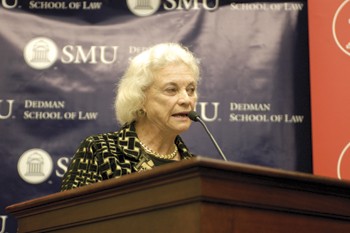
Sandra Day O’Connor spoke at the Dedman School of Law Wednesday about the importance of an independent judiciary. (Lindsey Perkins)
Former Supreme Court Justice Sandra Day O’Connor said the best way to teach young people about the civics and the importance of the judiciary is through modern media, such as interactive Web sites and computers. The comments came during a brief speech at an SMU conference about judicial independence and accountability.
“When civics and government are taught, they have the dullest books you’ve ever read in your life,” O’Connor said. “And kids don’t like to read anyway, so I don’t think that’s a winner.”
O’Connor said she is in the middle of creating a Web site that will teach children of all grades about the judiciary and its importance to American life. The site could be used in classrooms across the nation, she said.
Arizona State University has offered to host the Web site and have designers create it. A committee is in the process of being selected to produce the content.
She said the best way to have informed citizens is to make sure they learn about civics while in school. O’Connor said No Child Left Behind’s emphasis on math, science and reading has had unintended consequences for civics and history classes – schools either dropping them or reducing the amount of time spent on them.
She mentioned a survey conducted by the American Bar Association that found more people could name the Three Stooges than the three branches of government.
Accordingly, O’Connor said the Web site will be a totally interactive program that will be free of charge.
“Children today will sit endlessly in front of a computer,” she said. “We need to put this knowledge in this format.”
The former justice also said she is hearing more criticisms about the judiciary than any other time in her lifetime.
She mentioned recent elections in South Dakota and Colorado that challenged the independence of judges in the state. Both propositions failed before voters, but she said the root of those issues comes from people not having an understanding of the judicial system.
“If jurisdiction stripping is a punishment, then that’s where you get worried,” O’Connor said.
She said Minnesota v. White, a case that was decided while she was on the court, has created problems for an independent judiciary. The result of the case allows justices to answer policy or issue questions when running for office.
O’Connor said single-issue advocacy groups are targeting justices and pressuring them.
“I wasn’t aware that I was serving with a bunch of activist judges,” O’Connor said, citing one of the tactics such groups has taken.
O’Connor was the first female justice on the Supreme Court, appointed by Ronald Reagan in 1981.








